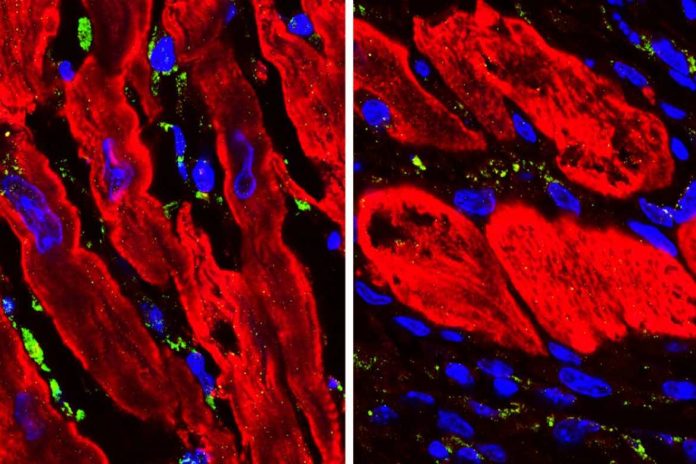A study using mice by scientists at the Eli and Edythe Broad Center of Regenerative Medicine and Stem Cell Research at UCLA reveals that cardiac muscle cells play a pivotal role in determining how the heart heals following a heart attack.
The findings challenge a longstanding paradigm about heart repair and identify a protein that could serve as a target for drugs to treat or prevent heart failure.
BACKGROUND
Heart attack is the leading cause of heart failure, which kills more than 600,000 people in the U.S. each year. An optimal repair response is critical for minimizing the amount of scarring after a heart attack because, once formed, heart scar tissue remains for life and reduces the heart’s ability to pump blood. This adds strain to the remaining heart muscle which, over time, can lead to the development of heart failure.
Heart muscle tissue is made up of cardiac muscle cells, which are responsible for the heart’s ability to pump blood. Because these cells have a very limited ability to self-replicate, they are unable to generate sufficient cardiac muscle cells to replace the tissue that is damaged in a heart attack. Instead, the heart produces scar tissue to preserve its structural integrity. It had been thought that cardiac muscle cells play a minimal role in scarring and the heart’s repair process.
METHOD
The researchers studied tissue from the hearts of healthy mice and the hearts of mice that were in the first three weeks of recovery from heart attacks. The scientists found that heart tissue samples from the post-heart attack mice had increased levels of a protein called ENPP1.
Next, they discovered that ENPP1 turns ATP, a molecule that is released by the dying cardiac muscle cells, into another molecule called AMP. The surviving cardiac muscle cells sense the presence of AMP as a signal that the heart is under attack, which prompts them to release specific molecules that cause the non-muscle cells around them to die. The researchers found that blocking the production of ENPP1 enhanced heart repair and reduced the formation of scar tissue, which in turn led to improved heart function.
IMPACT
Half of people with heart failure die within five years of their diagnosis, and there currently are no drugs that improve the heart’s repair process after a heart attack. The new study suggests how the repair process could be modulated to improve outcomes and identifies specific molecular targets for new drugs. The researchers are currently studying one drug candidate that they found to effectively inhibit ENPP1 in mice and in human stem cell-derived cardiac muscle cells.








